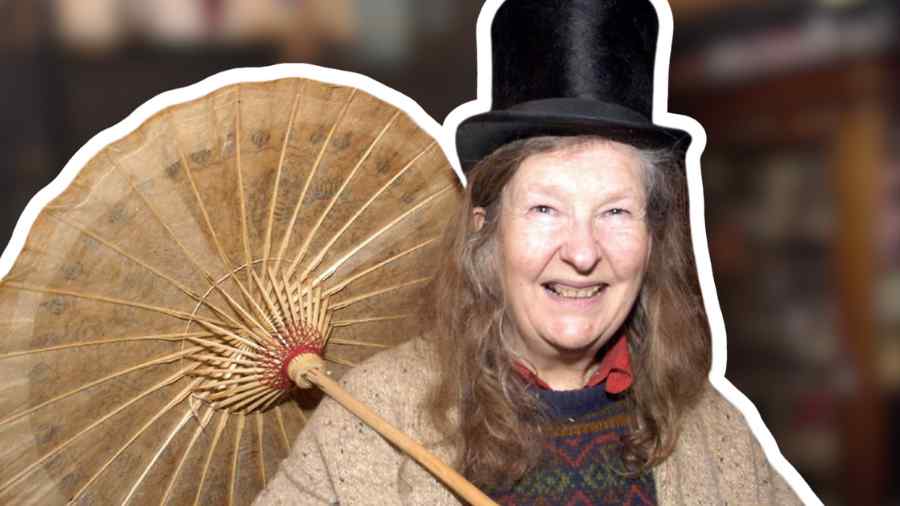Kristin Baybars: A Captivating Journey Through the Life of Britain’s Most Enchanting Toymaker

The name kristin baybars evokes a world of imagination, craftsmanship, and pure artistic magic. For decades, she stood as one of Britain’s most cherished and distinctive toymakers, celebrated not only for her handcrafted creations but also for the extraordinary shop she nurtured in North London. More than a shop, it became a sanctuary of wonder, a place where toys were not simply objects but expressions of creativity, storytelling, and soul.
Early Life and Artistic Influences
Kristin Baybars was born on Christmas Day in 1935, a fitting date for a woman whose future gifts to the world would revolve around childhood joy and artisan beauty. Growing up in an artistic family, Kristin was surrounded by creative influences from the beginning. Her mother, Ida Graves, was an accomplished poet, and her father, Blair Hughes-Stanton, was a respected wood-engraver and artist. Creativity was not something she had to seek outside; it flowed naturally within her household.
From a young age, Kristin showed signs of a deep artistic spark. She learned to sew, to experiment with materials, and to build things with her hands, often crafting her own toys and modifying them to her liking. One of her earliest projects was a doll’s house that she designed and furnished herself, marking the beginning of her lifelong fascination with miniature worlds. These early explorations laid a foundation that would shape her life’s journey and eventually allow her to develop an artistic voice that stood apart from mainstream toy production.
Training and Early Career
Before becoming a toymaker full-time, Kristin trained as an occupational therapist. This profession sharpened her appreciation for the emotional and psychological value of play, creativity, and the comforting effect of tactile objects. It also reinforced her belief that toys were not merely products for children but essential instruments for self-expression, imagination, and emotional development.
Although she found occupational therapy meaningful, her true calling continued to tug at her. She spent her spare hours refining her craft, creating miniature furniture, tiny dolls, whimsical creatures, and experimental toy designs. Her early pieces became favourites among friends, artists, and collectors, encouraging her to pursue her craft with greater commitment.
Establishing Herself as a Master Toymaker
By the 1960s and 1970s, Kristin Baybars had become an active part of London’s artistic and maker community. She gained a reputation for her meticulous attention to detail, her ability to transform ordinary materials into magical objects, and her unwavering commitment to handmade craftsmanship. Every piece she created was unique, made with patience, intention, and love.
Her work began gaining recognition among fellow miniaturists and toymakers, and she earned admiration for her dedication to quality during a time when mass-produced plastic toys were becoming dominant. Kristin championed the philosophy that toys should be created with care, individuality, and personality—qualities she believed children and adults could perceive instantly.
A lesser-known but significant part of her legacy is her contribution to the BBC children’s programme Play School, for which she designed the character “Humpty”. This playful, now iconic figure captured her artistic style beautifully—warm, whimsical, and timeless.
The Magical Toy Shop in Gospel Oak
Perhaps the most iconic chapter of Kristin’s life began when she opened her legendary toy shop at Mansfield Road in Gospel Oak, North London. The shop became her kingdom of imagination, known far and wide as a place unlike any other. Despite its modest location, visitors often described it as an “Aladdin’s cave”—a treasure trove of wonders filled with handmade toys, miniature worlds, wooden animals, dolls’ house furniture, puppets, marbles, kites, and mechanical curiosities.
The most memorable feature of the shop was the sign displayed outside:
“This is NOT a toyshop.”
This strange declaration was deliberate. Kristin believed that the word “toyshop” had become associated with mass-produced, disposable items that lacked soul or character. Her creations were not just toys; they were works of art. Her shop was a sanctuary for creativity, a place where both adults and children could rediscover the joy of imagination.
Inside, the atmosphere felt almost enchanted. Visitors recall shelves packed with intricate handmade pieces, softly lit corners filled with miniatures, and drawers that seemed to hide endless surprises. Many described the experience as stepping into a different time, or even another world entirely.
A Mentor to Makers and Miniaturists
Kristin’s influence extended far beyond her own work. She became a mentor to countless independent toymakers and miniature artists, offering guidance, encouragement, and a platform to sell their creations. Many successful artists owe their early breakthroughs to the opportunities she provided through her shop.
She had an exceptional ability to recognise talent quickly. If she saw potential in a maker’s work, she would enthusiastically add it to her carefully curated collection. Her shop therefore became not just a retail space but a gallery of handmade craftsmanship, representing creators from across the UK and beyond.
Kristin believed in preserving traditional toy-making methods and celebrating individuality. At a time when most shops were filled with identical factory-made products, she championed the idea that no two toys should ever be the same.
Personality, Philosophy, and Life’s Essence
Those who met her describe Kristin Baybars as a “true original”—warm, eccentric, fiercely intelligent, and deeply committed to her craft. She had an intuitive understanding of materials and movement, often creating toys that appeared simple but were engineered with expert precision.
Her personality was a blend of kindness, curiosity, and quiet strength. She valued authenticity and had little interest in commercial trends or mass-market appeal. Her life philosophy revolved around craftsmanship, integrity, and protecting the magic of childhood imagination.
She also held a deep appreciation for imperfection. In her eyes, a toy with a tiny flaw was more meaningful than a perfect factory replica, because it held the touch of its maker’s hands, the story of its creation, and its own unique character.
Later Years and Passing
In her later years, Kristin struggled with Alzheimer’s disease, which gradually affected her ability to manage her shop and maintain her craft. Despite declining health, the spirit of her work continued to inspire thousands of admirers, collectors, and younger makers. She passed away in November 2021 at the age of 85, leaving behind a legacy that remains deeply cherished.
Her shop closed after her passing, leaving many wondering about the future of its magical collection. Yet the memories, the stories, and the countless handmade pieces she created continue to circulate among collectors, museums, and admirers across Britain and beyond.
Legacy and Cultural Impact
Kristin Baybars holds a unique place in Britain’s cultural and artistic history. She was not merely a shopkeeper or a toymaker; she was a guardian of imagination, a defender of traditional arts, and an inspiration to generations of creators. Her life’s work demonstrated that toys can be art, that craftsmanship matters, and that the beauty of handmade objects has a power that mass production cannot replicate.
Collectors still treasure her miniatures. Toy historians reference her shop as one of the most important artistic destinations of its era. Children who once visited her magical world, now grown, continue to recall the wonder they felt stepping through her doors.
Even today, discussions of handmade toys in Britain inevitably include her name. Her influence lives on through the artists she mentored, the toys she crafted, and the memories she gifted to those lucky enough to discover her world.
Conclusion
Kristin Baybars remains one of Britain’s most remarkable toymakers—a visionary whose life embodied creativity, craftsmanship, and the enchanting power of imagination. Her shop in Gospel Oak stood as a symbol of artistic authenticity, and her handmade toys became lifelong treasures for those who collected them. Though she is no longer with us, her spirit endures through the artistry she championed and the magical legacy she left behind.



